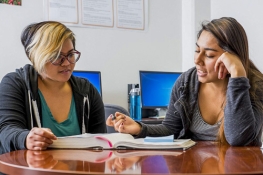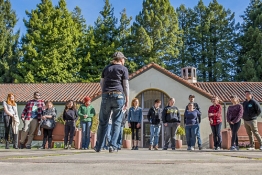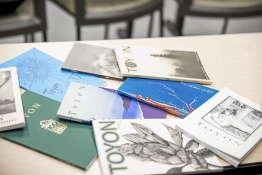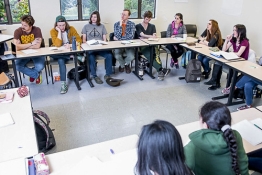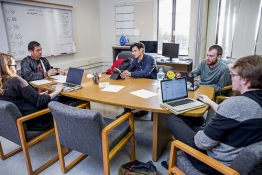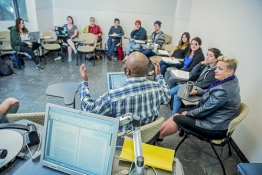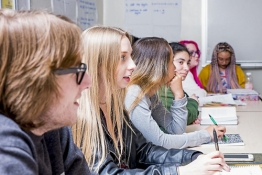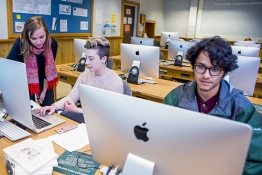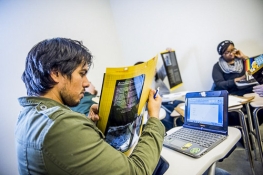What You'll Learn
In our First-Year Composition and Rhetoric courses we study the subject and practice of writing, build confidence as writers and learners, and understand that writing requires lifelong practice.
Please note: If you took AP, IB, or college credit for English in high school you might not need to take a first-year writing course. However, you should still take the "Choose a Writing Course Survey" when doing your registration tutoral. Ask your advisor to help determine if you have met the English GE requirement.
Program Outcomes
All of our courses are aligned to the program outcomes below.
1. Develop and articulate a Writing Researcher Identity
1. Develop and articulate a Writing Researcher Identity
Students will study, understand and articulate how learning new processes for and ideas about writing affects their thinking and behavior as writers and researchers.
What this means
Research in writing studies, education, and literacy studies indicates that people create “writing identities” that shape how they learn (and even what they are able to learn) about new writing situations. This means that writers take on different identities as they research and write in and across communities. Developing your understanding of how and why writing shifts across discourse communities makes you a writing researcher. And the more flexible your own writing processes and practices are, the more likely you’ll be to be able to successfully learn and adapt to different kinds of writing expectations. Understanding your existing knowledge about writing and reflecting on the ways that your experiences as a writer have shaped you and your writing identity can help you better understand how to use the writing research processes and practices you’ve learned.
2. Develop and apply flexible composing processes and practices
2. Develop and apply flexible composing processes and practices
Students will use composing processes and practices as a means to create and reconsider ideas.
What this means
Writers produce multiple drafts as they review, revise, and rewrite their texts. In our program, writers use multiple strategies and processes to conceptualize, develop, and complete projects as they compose across media and modes. Composing processes are seldom linear. Developing a flexible understanding of composing and writing practices allows you to understand how conventions change across contexts and occasions where writing and communication occur. This flexibility can also help you to assess and articulate what writing practices and knowledge you have or might develop that might be useful in each particular writing situation.
This outcome also emphasizes that practices such as thinking, reflecting, and collaborating are also processes of composing and writing. Writing in this sense “is not about crafting a sentence or perfecting a text but about mulling over a problem, thinking with others, and exploring new ideas or bringing disparate ideas together” (Estrem 19).
3. Develop and apply knowledge of multiliteracies and discourse communities
3. Develop and apply knowledge of multiliteracies and discourse communities
Students will demonstrate knowledge of the ways that language differences can shape our knowledge and activities as writers. Students will be able to articulate their awareness of language as a life-shaping force.
What this means
Developing understandings of our and others’ multiliteracies and discourse communities allow us to deepen and complicate the stories we can tell about writing – and that complexity can support our continued critical understandings of writing and ourselves as writers. Because we work, live and write mostly within a fairly narrow range of cultures and communities, we need to make conscious efforts to think about how attitudes about and practice of writing can change in other settings. We also need to think about how, as writers, we always have more to learn about how to adapt our writing or the genres we use to to address the needs of other cultures and communities.
This may seem unusual in an English course given that in many school settings, there is an understanding of the writing classroom as a place to teach a particular version of “English” practices (grammatical structures, word use, register, and even the structure and style of writing) that are “more desirable.” This focus on “standard English”, also known as “Edited American English” in the U.S., as the achievable and desirable mode of “correct writing” upholds white language supremacy and doesn’t help us grapple with the complexities of the writing we need to do in the world. Applying knowledge of multiliteracies means we understand and challenge asymmetrical aspects of power, language, knowledge, and assessment.
This learning outcome, put simply, says that it’s not enough to teach and learn a narrowly constructed version of English. We want to try to understand Englishes and language use better. We also want to understand our own language background and history, the choices other people make, and the value of diverse and interesting language practices.
4. Develop and apply knowledge of discourse, genre, rhetoric, and identity
4. Develop and apply knowledge of discourse, genre, rhetoric, and identity
Students will demonstrate knowledge of concepts that theorize how and why language use changes across and within communities of practice.
What this means
This learning outcome asks us to explore the ways in which we read and compose selves (our own and others') as part of our literacy and communicative practices. We'll approach writing "not simply as a means of learning and using a set of skills, but rather as a means of engaging with the possibilities for self-hood available in a given community" (Roozen 51).
To explore the relationship between literacy and identity, we take up the concept of discourse. Generally understood as language in use or authoritative communication, we consider discourse through sociological definitions which positions language as ideological and knowledge-producing. Discourse in this context shapes how we think and communicate. In our everyday life we encounter and participate in multiple discourses that are taken up and recreated by various groups and social institutions (such as schools, towns, clubs, ethnic and cultural groups, families, courts, hospitals, businesses, and so on).
One of the central ideas of this outcome is that we do not merely use our literacy in alphabetic texts in these various discourses (or discursive sites), rather we become literate in the discourses themselves. We develop literacy (or fluency) in language use along with thoughts, ideas, beliefs, values, identities, modes of interactions with others, and other behaviors.

